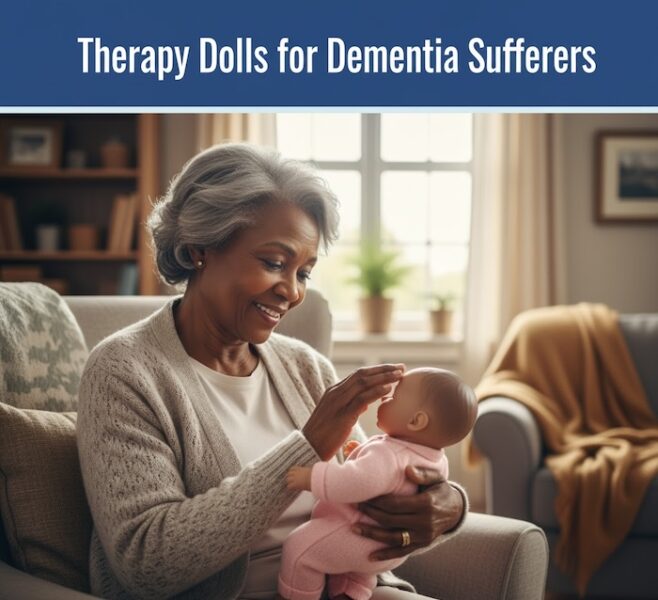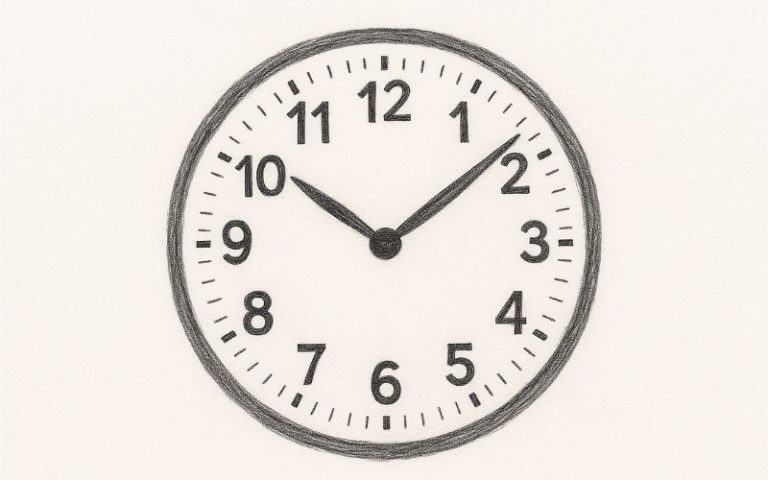For a person living with dementia, the world can often feel confusing and isolating. But a simple, compassionate intervention—the offer of a therapy doll can sometimes work wonders where words fail.
This isn't about treating an adult like a child; it's about tapping into a profound human need for purpose, connection, and unconditional love. Seeing an older adult gently cradle and care for a doll, their face softening with tenderness, reveals the powerful comfort and reduced anxiety this tool can provide.

Let's explore how these companions are making a positive difference in the lives of people navigating dementia.
Baby Dolls for Alzheimer’s Patients are Therapeutic
A helpful, non-drug way to calm and soothe agitated seniors with Alzheimer’s disease or dementia is to give them a soft, lifelike baby doll to cuddle.
These therapy dolls can even be effective in calming someone with severe agitation or other significant behavioral challenges.
We explain why therapy dolls can be effective, share tips for introducing a doll to an older adult, discuss why some find this idea controversial, and suggest inexpensive dolls that older adults may enjoy.
Why Therapy Dolls for Dementia Work
Therapy dolls can help seniors feel useful and needed, providing a positive focus.
Similar to the effect of soft toys like stuffed animals, hugging something soft helps someone with dementia feel comforted and soothed.
Another reason therapy dolls are helpful is that they can evoke positive memories of early parenthood for both women and men.
Many older adults enjoy rocking and cuddling their doll. Some even adopt the baby as their own and make caring for it part of their daily routine.
Having a child to care for can also ease feelings of isolation and sadness.
After all, when interacting with real babies, many people find their spirits lifted and their nerves calmed.
VIDEO: Therapy Dolls for Dementia are Controversial but Effective
How to Introduce Doll Therapy
The best approach is to casually introduce the doll to your older adult and let them decide whether they like it.
If they show no interest in the doll or become upset, don’t make a big deal out of it.
Even if someone isn’t interested in the moment, they may change their minds in the future so you could try again in a few weeks or months.
A few tips:
- Don’t treat the doll as a doll; refer to it as a baby and treat it as a real child.
- Get a lifelike doll, but one that doesn’t cry – that might not be very pleasant.
- Don’t force it; allow your senior to get to know the doll slowly.
Some Caregivers Find Dolls Controversial
A doll can be a safe and inexpensive “treatment” for someone with dementia.
We’ve heard from many family caregivers who say their older adults are calmer and happier now that they have their own baby doll. They’re relieved to have found a non-drug solution that eases an aging adult's dementia symptoms.
However, some people are concerned that giving their older adult a doll would be demeaning or patronizing. But when someone has dementia, helping them feel safe and happy in their current reality is the top priority.
If trying unconventional ideas such as baby dolls, fidget blankets, and other simple activities and toys might help them feel better and enjoy life more, why not give them a try?
If they do get upset or offended by the doll, you’ll know to cross that off the list of potential calming activities. Or, you could put it away and try again as their dementia progresses.
You know your older adult best. If a doll isn’t likely to suit their personality or preferences, consider other options.
6 Soft – Lifelike Doll Options
- Lots to Cuddle doll (20 inches tall) – Caucasian
- Lots to Cuddle doll (20 inches tall) – African American
- La Baby doll (20 inches tall) – Hispanic
- Lots to Cuddle doll (20 inches tall) – Asian
- Lifelike Reborn Baby Dolls (17 inches tall) – fair skin
- Lifelike Reborn Baby Dolls (17 inches tall) – deep skin
Conclusion
Introducing a therapy doll isn't a magic cure, but for many, it becomes a cherished source of solace. It’s a simple yet profound way to reduce distress, spark moments of joy, and provide a gentle focus for restless hands and a weary heart.
If you're considering this approach, observe with an open mind. The ultimate goal isn't the doll itself, but the peace and purpose it can inspire. In the challenging landscape of dementia, these small moments of connection are truly priceless victories.
Recommended for you:
- 10 Affordable Products for People with Dementia That Increase Comfort and Calm
- 6 Ways to Calm Dementia Fidgeting Hands
- How to Understand and Manage Dementia Behaviors: A Comprehensive Guide
The prices shown reflect those in effect at the time of publication; prices and availability are subject to change. This article contains some affiliate links. If you buy through an affiliate link on our site, we may earn a small commission, at no additional cost to you. For more information, see How We Make Money.
About the Author

Connie is the founder of DailyCaring.com and was a hands-on caregiver for her grandmother for 20 years. (Grandma made it to 101 years old!) She knows how challenging, overwhelming, and all-consuming caring for an older adult can be. She also understands the importance of support, especially in the form of practical solutions, valuable resources, and self-care tips.














My 94 year young mother now has short-term memory loss dementia. My sister, her main caregiver for the past 5 yrs,
found she really enjoys word games and word puzzles for a stimulating and relaxing pastime. I suggested the coloring books for adults. My sister thought they may appear too simplistic and demeaning to my mother who had been a lifetime hobby artist. I took a chance and was amazed at how much my mother enjoyed very carefully coloring the ready made drawings. She especially loved to plan and choose what colors to use. This helped her motor control with a shakey hand, and used her individual creativity to choose the colors. Far from demeaning she found the books very exciting and challenging. Our mother took great pride in showing us each finished page!
That’s wonderful! We’re so glad you decided to give the coloring books a try and that your mother enjoys them so much 💜
In my experience doll therapy works depending on the awareness the patient have in their dementia. For some they interact to the doll like a real baby and have a resident who’s very quiet, but once she had the doll she never stops talking to the doll as if her baby ( she never had children) and even engaging to the staff showing how proud she is with her baby being so adorable. Another resident with dementia wouldn’t care because she is aware it is only a doll and would even squash her in one corner. People are different in the same manner Dementia has a different face.
If it works for the person and helps their well- being why not? For as long as their dignity is not compromised.
So true, each person will be different in their interests. But if someone finds comfort and joy in their doll, it’s a wonderful thing.
I worked in nursing homes and facilities for mentally challenged young people. We used to have to hide dolls and things like trucks when Medicaid surveyors came because they thought such things were not age appropriate. Often the patients would cry for what was temporarily taken from then. The women often thought their babies had been kidnapped. Finally, someone got a brain and changed the regulations.
It’s good that they finally came to their senses and changed those rules! If something doesn’t cause harm and can bring joy or comfort, it’s a wonderful thing to provide for those who are interested.
As a nurse and the daughter of an elder, I am appalled at this article regarding “doll” therapy. No where does this article distinguish between types of dementia and phases of dementia and WHEN doll therapy may be appropriate and beneficial. If a patient is detached from reality, at times or all the time, I would think doll therapy maybe helpful. On the other hand, there are enough stresses our elderly endure without having to endure a doll that is talked about as if real when it is just a doll when the elder is not detached from reality. That stress or confusion between what is real and what is not could push a reality based patient into a fantasy world. How fair or human is that? I would hope we never stop using our intellect to benefit our elderly, our fellow human beings, in the real world and not pacify them with fantasy because we thought it might help with some acting out behaviors. That is so disrespectful and could be medically harmful. The “doll” therapy was pushed on my mom and not helpful to her but demeaned her. Someone thought it would help her sleep.
Regardless of the stage or type of dementia, each person has different preferences and may or may not be interested in a doll. And with dementia, experimenting is usually the only way to discover the activities and means of comfort that the person prefers.
Generally, if there’s a simple, inexpensive, non-drug option that could potentially bring comfort or happiness, there’s no harm in giving it a try — especially if it can reduce the need for medication.
I would hope a nurse would be able to assess the patient’s or resident’s mental status to decide whether a doll would be therapeutic. For many of my patient’s with dementia, a baby doll is appropriate. For others, folding laundry is a great activity.
Absolutely, the type of activity a person will enjoy definitely depends on their unique interests and preferences.
Susan,
Are you a nurse in a dementia care facility? I would wager not. Anyone who has spent some time working with dementia residents will tell you that the last thing anyone can tell from one dementia resident to another, regardless of type or “phase,” is which therapies will be helpful and which what will not.
In our residence we have many stations set up throughout the building to encourage interaction. One of them is a doll in a bassinette. We have had many people walk right by and never interact with the doll. We have had others pick up the doll and not want to put it down for MONTHS.
Suggesting that this therapy could somehow be medically harmful is silliness. In what way could offering a doll hurt? There is no one thing that “pushes” a dementia resident into a fantasy world. Being a nurse you should know that protein buildup on the synapses of the brain cells disrupts healthy brain function, causing dementia. The proteins cause tangles that don’t allow the cells to communicate. There is no way of telling what synapses in what part of the brain will be affected, so there is no way saying how dementia will progress in any patient. There are no reliable triggers to be known. Going from our “reality” into a personal “reality” is a step in dementia that some may go through quite early, and others may slip into and out of for years. Forcing our “reality” on dementia patients is never helpful, it only placates the family members at the expense of the mental well being of the patient.
While doll therapy may have not been appropriate for your mother, at least she made the decision of what was right for her.
It seems like the forced introduction of the doll may have been a mistake by the caregiver, however suggesting that doll therapy is demeaning for adults with dementia is simply not helpful.
At least someone made an attempt, better than ignoring your Mum’s problems. I, personally, am in the market for a realistic baby doll, for MYSELF. I love dolls, I fell in love with the babies when I had a market stall on the Esplanade in Cairns, Qld. The maker loved every baby she made, she wasn’t demented in any way, she just loved baby dolls.
Great point, there are people of all ages who love dolls.
In the many years of nursing the care of the older person, I have used this technique many times. In the unit I worked we had both girlies lifelike dolls and boy’s who were in every way boy’s and girls. We also had changing mats and nappies both the old type towelling, so that they might remember how to change their charge for that period of time. If things went well and the resident took to the baby all we did is help and advise them. At no time did we ever not tell the person that it was a real baby. Most did understand and we brought it in when we were in a group session talking about the older ways of bringing up baby into child hood. We even had men in the group and they were very caring and treated the baby carefully. Most had good knowledge of parenthood. We also had an arsenal of old clothes and items dating back to the various periods in their lives. It was amazing to hear them talk about those times. Even people who appeared to have locked in syndrome remembered and actually smiled and made attempt at conversation if they thought that something was not right when watching fellow patients. I have been retired for about 12 years now and miss it so much. It was my dream job and hearing on the news about elder abuse really brings me to tears with anger.
It’s wonderful to hear how much you loved your job and how you treated your residents with such kindness and compassion 💜
So many older adults do enjoy baby dolls, it’s great to give people the option to try different activities to see if they enjoy them.
Remember all dementia patients are different. My mother never lost her awareness of reality. When she was distressed a career (who didn’t know her) gave her a doll to look after & mum threw it across the room & shouted ‘ I am not a child & Im not stupid’. She loved babies & was never happier than when a baby was in the room but she could not be fooled by giving her a doll.
Yes, each person with dementia has different preferences and may or may not be interested in a doll. Finding activities and means of comfort usually takes some trial and error.